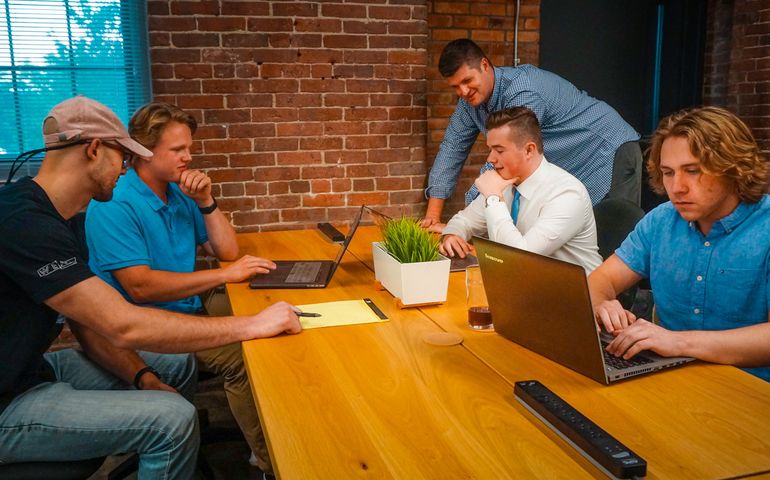Processing Your Payment
Please do not leave this page until complete. This can take a few moments.
- News
-
Editions
View Digital Editions
Biweekly Issues
- December 15, 2025
- December 1, 2025
- Nov. 17, 2025
- November 03, 2025
- October 20, 2025
- October 6, 2025
- + More
Special Editions
- Lists
- Viewpoints
-
Our Events
Event Info
Award Honorees
- Calendar
- Biz Marketplace
Starting up young talent in Waterville: New program helps students get businesses off the ground
 Photo / Maureen Milliken
Students from Colby and Thomas colleges made up the inaugural group of Summer Startup, a Waterville mentoring program for young entrepreneurs. From left, at Bricks Coworking & Innovation Space, in Waterville, cofounder Nick Rimsa; Christian Krohg, a Colby sophomore; R.J. Anzelc, cofounder; Tyler Hansen, Colby sophomore; and Dylan Veilleux, a Thomas senior.
Photo / Maureen Milliken
Students from Colby and Thomas colleges made up the inaugural group of Summer Startup, a Waterville mentoring program for young entrepreneurs. From left, at Bricks Coworking & Innovation Space, in Waterville, cofounder Nick Rimsa; Christian Krohg, a Colby sophomore; R.J. Anzelc, cofounder; Tyler Hansen, Colby sophomore; and Dylan Veilleux, a Thomas senior.
Tyler Hansen thought software for creating online portfolios could be more user-friendly.
Christian Krohg saw the proliferation of app-based food delivery services and knew Waterville would be a perfect fit.
Dylan Veilleux wanted to find a way to create bio-bricks from hemp stalk for more affordable heating.
Like many of their fellow college students, the three saw a need and had an idea to fill it.
But unlike most people with ideas, Hansen, Krohg and Veilleux have started or are developing businesses based on those ideas.
The trio, as well as Joshua Kim and Kia Jones, are getting businesses off the ground by participating in Summer Startup, a pilot program put together by entrepreneur Nick Rimsa, and R.J. Anzelc, owner of Bricks Coworking and Innovation Space in Waterville.
Two dreams, one reality
The program wasn’t planned. “I kind of had this pipe dream of doing this, but didn’t know how to get the students,” says Anzelc, as he, Rimsa and three of the students sat down with Mainebiz recently.
Rimsa, who teaches product design at Colby, was also working on his startup, Eariously, which converts text to audio. He worked out of 173 Main St., a downtown building owned by Colby that, among its office and retail tenants, has student innovation space.
“Not only did I have the students from my class, but at 173 Main I was being approached by dozens of students with ideas,” Rimsa says.
On top of it, “school was out, and there was still a group of kids who still wanted to be working on their stuff.” He was trying to think of a way he could keep mentoring them over the summer.
Anzelc and Rimsa met at a Mainebiz On the Road event April 8 in Waterville. They started talking, and Summer Startup was created.
“It came together really quickly,” Rimsa says.
Mentoring, boot camp, events
The structure of the program is loose, working around the students’ other commitments.
Individual mentoring includes instruction in grant writing and marketing research — areas that often pose obstacles that cause great ideas to crash and burn before becoming a business.
The program has partnered with the Central Maine Growth Council on Startup Stories, a monthly series featuring founders of Maine-based startups. It launched in July with Justin Hafner, CEO and co-founder of KinoTek, the 2019 Greenlight Maine Collegiate champion.
In late July, the program launched the four-part weekly Lean Startup Boot Camp, in which Mike Duguay, executive director of the Harold Alfond Institute for Business Innovation at Thomas College, guided participants through the five stages of a business startup, including idea generation, market validation, business model creation, scaling and digital and social media marketing.
The students have also visited events like Startup Maine in Portland earlier this year, and more recently, the Aug. 22 Mainebiz Executive Insights forum.
The ultimate goal is for the students to secure grants from Maine Technical Institute, which opened a Waterville office in July.
Getting to work
The students are at different stages of their ventures.
Krohg, a sophomore at Colby, started his first business, a DJ service, when he was in elementary school. He runs Easy Eats with two out-of-state partners, and it operates both at Colby and Bates College. It has 400 users and $10,000 in revenue. He was one of the winners of Colby’s pitch contest in May, with a $5,000 prize.
He says the goal of joining Summer Startup was to “hit the drawing boards.”
“What worked? What didn’t?” he says. “This summer, we decided, ‘Let’s make this perfect.’”
Hansen, also a sophomore at Colby, focused on market research — “slowing down and getting to know the customer.”
His portfolio software program, Piefolio (because it makes setting up a portfolio website easy as pie) is still in development.
Jones, a senior at Northwest Missouri University who came to Maine to help Rimsa with his app design, is developing her own software prototype. Kim, a senior at Colby, is developing Sklaza, a marketplace for college students.
Veilleux’s project is the only one that’s not aimed at college students. TreeFreeHeat would take unused hemp stalks left over from hemp production and process them into biobricks for renewable heating.
Veilleux, a senior at Thomas, says if it weren’t for Summer Startup, “I never would’ve started. It never would’ve happened. There were too many challenges.”
Hansen agrees. “I didn’t know anything about market research, I didn’t know anything about grant writing.”
’The people who come back’
The students say aside from learning the nuts and bolts of getting a business going, a large part of the program is the support and collaboration from Rimsa, Anzelc, and other participants.
Rimsa and Anzelc say it takes a certain kind of student entrepreneur to be part of the program.
“We want to see the drive from them,” Anzelc says. “There has to be a fire behind them.”
He says those who make progress are the ones who are “able to let go of an idea a little bit,” and take feedback and constructive advice.
“Just starting, just going in the right direction, it’s hard,” says Rimsa. “It takes a lot of hard work.”
The students may have different businesses, “But they all care deeply about problem solving,” he says.
“Everyone has good ideas,” Rimsa adds. “Someone will come to me and say, ‘I’m thinking about making this.’” He encourages them, but asks, “What’s the first thing you have to figure out?”
Many don’t come back after being handed that challenge. “What we’re left with are the people who come back,” he says.
Keeping talent in Waterville
The program is also aimed at helping the community by keeping young talent around after graduation, Anzelc says.
The city has a growing tech community — aside from MTI, businesses like Genotyping Center of America and CGI Technologies have opened offices in the city.
Anzelc said the students also benefit from working at Bricks.
“There’s now a community of people working here, and working in the community,” he says. “I think we have the infrastructure. People want to be here.”
Rimsa is a good example. A Connecticut native, he left Maine after his 2013 Colby graduation. He came back in January to teach a product design class while working on his app, which students have helped with, but planned to eventually move to Los Angeles.
Now? “I’m sticking around,” he says. “I love working in this space.”
In August, Eariously received a $10,000 grant from MTI. Other support has come from Skowhegan Savings, Mid-Maine Chamber of Commerce, the Harold Alfond Institute for Business Innovation at Thomas and Bill Mitchell, owner of GHM Insurance. “They want to see it succeed,” Anzelc says.
Anzelc and Rimsa say this summer’s “beta test” was a success, and the program will grow and be tweaked, with more of a focus on grant writing and pitching. While the students credit Rimsa and Anzelc for how far their work has come, Rimsa says the young entrepreneurs are the driving force.
The program only works for people who want to work. “They give us a lot of credit, but they’re the ones doing the work,” he says.
Mainebiz web partners

The Giving Guide
The Giving Guide helps nonprofits have the opportunity to showcase and differentiate their organizations so that businesses better understand how they can contribute to a nonprofit’s mission and work.
Learn More
Work for ME
Work for ME is a workforce development tool to help Maine’s employers target Maine’s emerging workforce. Work for ME highlights each industry, its impact on Maine’s economy, the jobs available to entry-level workers, the training and education needed to get a career started.
Learn More
Groundbreaking Maine
Whether you’re a developer, financer, architect, or industry enthusiast, Groundbreaking Maine is crafted to be your go-to source for valuable insights in Maine’s real estate and construction community.
Learn more-
The Giving Guide
The Giving Guide helps nonprofits have the opportunity to showcase and differentiate their organizations so that businesses better understand how they can contribute to a nonprofit’s mission and work.
-
Work for ME
Work for ME is a workforce development tool to help Maine’s employers target Maine’s emerging workforce. Work for ME highlights each industry, its impact on Maine’s economy, the jobs available to entry-level workers, the training and education needed to get a career started.
-
Groundbreaking Maine
Whether you’re a developer, financer, architect, or industry enthusiast, Groundbreaking Maine is crafted to be your go-to source for valuable insights in Maine’s real estate and construction community.
ABOUT
NEW ENGLAND BUSINESS MEDIA SITES
No articles left
Get access now
In order to use this feature, we need some information from you. You can also login or register for a free account.
By clicking submit you are agreeing to our cookie usage and Privacy Policy
Already have an account? Login
Already have an account? Login
Want to create an account? Register
Get access now
In order to use this feature, we need some information from you. You can also login or register for a free account.
By clicking submit you are agreeing to our cookie usage and Privacy Policy
Already have an account? Login
Already have an account? Login
Want to create an account? Register







0 Comments